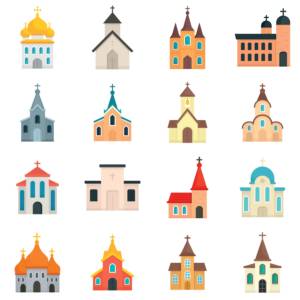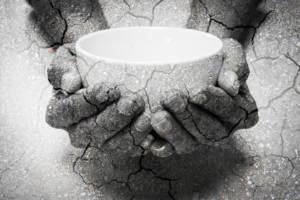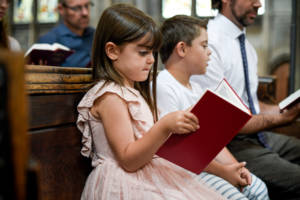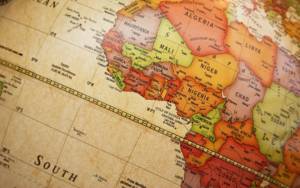Spirituality and Religious Worship in the Age of COVID-19
With most houses of worship closed to the public during the coronavirus pandemic, believers are finding alternate ways to practice their faiths.
The novel coronavirus has significantly changed life on planet Earth, including how humans approach spirituality. With multiple nations enacting shelter-in-place measures and urging citizens to practice social distancing, houses of worship have closed to the public. Many belief systems are inherently communal, so how are devotees practicing their faiths in these unusual times? With flexible approaches, perseverance, and a little help from modern technology.
Impacts on Communal Worship
Religious authorities and communities all over the globe have taken steps to keep worshippers safe. Vatican News reported on March 30 that Pope Francis is broadcasting his daily Masses to isolated Catholics worldwide. Similarly, Catholic dioceses across Canada and the rest of the world have canceled public worship and are now livestreaming Masses, the Holy Eucharist, and other services.
Muslims have also been affected. Al Jazeera reveals that mass prayers have been suspended in several countries. Writing for The Star, Muslim legal scholar Shaikh Ahmad Kutty and lawyer Faisal Kutty decry religious leaders who have kept their mosques open. “One of the five higher objectives of the Sharia is the preservation of life,” they argued. “Therefore, Muslims are mandated to take all steps to prevent harm…[including] to prevent the spread of diseases.” Canadian synagogues have also halted public worship, with many rabbis conducting online services.
Devotees of other religions are following social distancing guidelines during their spiritual practices. Buddhist, Sikh, and Hindu temples have halted worship services. Buddhistdoor Global mentions that several organizations are offering online retreats and livestreamed programs. Neopagans and followers of African and Indigenous spiritual traditions continue solitary worship while reaching out to their online communities.
Social Distancing and Solo Spiritual Journeys
Despite the strange new reality created by COVID-19, social distancing has provided some unique opportunities. Some are using the extra time at home to better cultivate solitary spiritual practices. Depending on the person, these may include prayer, creating or developing in-home altars, reading religious texts, and meditation. Even people who aren’t particularly religious have turned to meditation to help themselves cope with the pandemic. YouTube hosts tons of guided meditation videos, and health coach Amanda Capritto profiles several meditation apps in a March 27 CNET piece.
For others, social distancing offers a chance to evaluate their beliefs and seek answers. “At this time of self-isolation and social distancing we have a lot of fear of not knowing,” reads the front page of the Salt Lake Buddhist Temple website. “This will be a good time to listen to the Dharma but also to ask questions.”
Charity and Community Support
Communities of faith are providing financial and social relief during the COVID-19 pandemic. The Canadian Jewish News profiled Jewish Free Loans Toronto, which offers several interest-free loan options to people impacted by the outbreak. Some churches have kept their food pantries open while practicing social distancing measures to avoid infection. The Washington Post reported on March 19 about an Alabama megachurch that hosted drive-through coronavirus testing.
COVID-19 has proved especially challenging for Sikh communities, which typically offer free community meals at their gurdwaras. Some have kept their langars open while practicing extensive precautions to keep visitors safe. The Surrey Now-Leader mentions Gurdwara Dukh Nivaran Sahib, which switched to drive-through and takeout langar meals. The temple also provides grocery delivery to senior citizens, disabled individuals, and international students.
Faith in a Time of World Crisis
The COVID-19 outbreak has altered human life, perhaps for good. However, it’s also proven humanity’s resilience and indomitable spirit. Many are looking to their faiths during this crisis for comfort, community, and answers. Developing inner peace, reaching out to other believers, or finding ways to help others are all salient examples of how faith and religion can have positive impacts in our uncertain times, even without the group worship component traditionally associated with many religions.
Sacred Grounds: The Surprising Religious History of Coffee
The humble coffee bean has a surprising religious history that weaves together many fascinating tails and origin stories.
Would you call your morning cup of coffee a mystical experience? In our quest to power up for the day, we probably don’t think about coffee’s origins. Yet this humble bean has a surprising religious history. It’s a fascinating and complex tale that began in Africa many centuries ago.
Coffee’s Ethiopian Origins
Coffee cultivation takes place in over 80 countries today, most of them located in tropical regions. One popular legend claims that an Ethiopian goat herder discovered the plant after noticing strange behavior out of his goats. After finding a green shrub decked with bright cherry-colored berries, he picked some of the fruit and brought it to a local monastery. The caffeine enabled the monks to stay awake, and the rest was history.
Except that it wasn’t really history.
Journalist Livia Gershon explains that the coffee plant did first grow wild in Ethiopia. However, the local tribespeople discovered it first. Thanks to its energizing properties, the bean was used as a sacrament in communal ceremonies. Hunters also imbibed it to stay alert and stave off hunger while seeking their prey. It eventually made its way to other parts of Africa, where other cultures found more uses for it. Some brewed a drink from the vivid red berries, while others roasted them in fat or chewed them without any prep. The Haya people of Tanzania even traded the beans as currency.
Java and Midnight Meditations
Just in case you thought the Ethiopian goat herder would get all the credit, there are two other myths about coffee’s origins. The Spruce‘s Lindsey Goodwin mentions one story in which a Sufi mystic finds and chews the berries during his journey through Ethiopia. Another tale claims that an exiled sheik on the verge of starvation discovered the plant in the wild. When he tossed the berries into his campfire, he fell in love with their aroma but found them too hard to chew. After trying to soften them in water, he drank the liquid and felt invigorated.
It’s hard to separate truth from myth, but we do know that Yemenite Sufi Muslims consumed coffee to keep alert during nighttime chanting rituals. Coffee eventually spread throughout the rest of the Muslim world, fueling Yemen’s economy for over 250 years. Many people drank it to stay awake during late-night Ramadan festivities, and coffeehouses sprung up to fuel the demand. More legends propagated about the bean’s origins, with some crediting Muhammed or the archangel Gabriel for gifting it to humanity.
Coffee Comes to Europe and America
Coffee was widely consumed in the Muslim world by the 1500s. Around this time, Europeans began encountering the drink during their travels. Although they found it bitter due to its initial lack of sugar, they loved its energizing effects. The drink soon came to Europe, where it was both loved and considered controversial. Just as in the Middle East, coffeehouses popped up in major cities throughout the continent. They became cultural centers and community meeting places, much like taverns were during America’s colonial era.
One often-repeated legend claims that several clerics asked Pope Clement VII to ban coffee, insisting that it was “Satan’s brew.” Yet when the pope tried coffee for himself, he enjoyed it so much that he gave it his blessing. From there, coffee came to the Americas, where early colonialists embraced the brew. “Coffee makes a man more reasonable, better able to concentrate and hardworking,” comments Laura Turner in the Washington Post. “No wonder people might see it going hand in hand with the Protestant work ethic.”
All Hail the Mighty Bean
Canada ranks third in the world for coffee consumption. For many of us, this bold brew is a must-have that fuels our bodies and minds. Whether or not we thank the divine for our daily drink, it certainly holds a revered place in our modern lives.
Selecting a Church Near Your New Home
Picking a church near your new home is a big decision. Thankfully, it doesn’t need to be a challenge. Check out these tips to make your choice a bit easier.
Moving to a new area can be scary. While you may have thought through your decision, there are probably plenty of concerns still swirling around in your mind. After being involved with community groups like a local church, many people worry that they will not be able to find another organization that lives up to the last. Picking a church near your new home is a big decision. Thankfully, it doesn’t need to be a challenge. Check out these tips to make your choice a bit easier.
Do Your Research
The beauty of the internet is that it has made life a lot easier on almost all fronts. When you’re seeking information about your new neighborhood, hop online. A simple search on Google can provide you with a ton of information about churches and other religious organizations in the area. Be as specific as possible, mentioning your denomination and any other factors that might come into play when picking a church. For example, some groups are more welcoming of LGBT members than others. Search for gay-friendly options to avoid feeling uncomfortable or judged in your chosen place of worship.
Settle In
While you might be able to glean a lot of useful info from a quick internet search, the old-fashioned methods can prove even more beneficial. How you experience the community you are moving into will be dictated by the routine you establish there. Take your time with big decisions like selecting a church. Wait until you’re settled in your home and have begun working at your new job. This will allow you the chance to learn the lay of the land and meet some locals. The more familiar you are, the easier it will be to select a fitting option.
Ask Around
As you get to know more people in your community, you may feel comfortable enough to start asking for recommendations on local spots. If someone you’ve met has openly discussed his or her religious affiliation with you and it aligns with your own, then you might have an easy time finding a church. However, not all people you encounter will be able to provide you with useful information. Just as a restaurant recommendation is based around the tastes of the diner, a church opinion reflects the opinions of the one who has come to worship. Explore all suggestions to see if any fit.
Practice Patience
If it is taking you a very long time to find a church that you’re satisfied with, you may feel compelled to settle on any option that comes your way. Sadly, this will not yield good results for you. While your connection with God means you can take your faith with you wherever you go, some churches are just not good fits. By settling on one out of frustration, you are setting yourself up for an unhappy experience. Exhibit patience throughout your search, and eventually you will discover a church that makes you happy.
Pray
Finally, never look past the power of prayer when you need guidance. Take time to talk to God and ask for some clarity. While you might not receive a direct answer, there will likely be signs pointing you in the right direction. It has been said many times that God works in mysterious ways. By clearly expressing your problem through prayer, it becomes a bit easier to see the path that She has laid out for you.
Selecting a church is one of many tough decisions you will need to make after moving to a new home. Finding success comes down to weighing the options presented to you. Practice patience, ask around for input, and discover a house of worship that satisfies your soul.
Is Our Fear of Death Killing Us? Some Scholars Say Yes
Why do we fear death in modern times, and has this caused other problems for humanity? Anxieties about death may be at the root of our social ails.
Are you afraid of death? Many civilizations viewed it as an inseparable part of existence. Technology and medicine have lengthened our lives, but our world is also full of economic, social, and environmental turmoil. Why do we fear death in modern times, and has this caused other problems for humanity? As surprising as it may seem, anxieties about mortality may be at the root of our social ails.
Why We Avoid Thinking About Death
If you can’t wrap your mind around your own mortality, your brain may be to blame. Live Science mentions that our brains shield us from the idea of our own mortality. Researchers theorize that this may have evolved to ensure our survival. Greater awareness of our deaths could have made us more risk-aversive, discouraging us from engaging in activities like gathering food or finding mates.
Astonishing as this idea sounds, it’s not new. In his 1973 book “The Denial of Death,” psychologist Ernest Becker concluded that humans actively avoid thinking about their own mortality. On the Ernest Becker Foundation website, Glenn Hughes adds that mortality-related anxieties can prompt rigid identification and adherence to political, religious, or ideological beliefs. If these grow into intolerance and self-righteousness, it can lead to persecution, bigotry, and oppression.
There may be real-world evidence for Becker’s ideas. In the 2015 book “The Worm at the Core: On the Role of Death in Life,” authors Sheldon Solomon, Jeff Greenberg, and Tom Pyszczynski document their experiments based on Becker’s thesis. They concluded that “after people are reminded of their mortality they become much more hostile and vicious.” Speaking to journalist Carey Goldberg, Solomon added that excessive fear of death influences our judgment, limiting our compassion for others and even impacting how we vote.
Religion, Mortality, and the Afterlife
Did our ancestors’ fear of death create religion? According to New Humanist writer Lewis Wolpert, anthropologist Bronisław Malinowski proposed that religion may have helped quell human anxieties about mortality. People desire answers and certainty to cope with the unknown. Belief in an afterlife and the existence of the soul could offer comfort to the living. Rewards in the afterlife can make our struggles seem to be worth the tribulations that come with them. Maybe it isn’t so bad if we reside in Paradise after we pass away, so the logic goes.
Sheldon Solomon proposes that culture develops to provide meaning in life and combat the terror of mortality. Culture and religion are often intertwined. Religious beliefs can be expressed as empathy and inclusive attitudes towards others. Fundamentalism does the exact opposite: gatekeeping and shutting others out, reducing one’s worldview to “us against them.”
The Death Positive Movement
The Order of the Good Death is at the forefront of the Death Positive Movement. It seeks to remove social stigmas around death, suggesting that the “culture of silence” surrounding it can be broken through discussion, learning, innovation, and artistic expression. Its key goals also include empowering people to care for their dead and make their own end-of-life decisions.
Learning from other cultures can also help, especially since many non-Western cultures deal with death more openly. Ghanaians throw funeral parties and craft elaborate coffins. Cultural Colectiva’s Zoralis Pérez describes Ma’nene, an Indonesian ritual in which mummified corpses are exhumed, cleaned, dressed, and interacted with by their families. Traditional Irish wakes began when a deceased person’s female relatives washed and kept vigil near the body.
Death as Part of Life
One day, each of us will die. How we handle death is just as important as how we deal with life. Religion and philosophies may provide some comfort, but altering our cultural view of mortality is also essential. This change can help us develop better coping skills and possibly understand the roots of social problems plaguing us today.
Thanatology: The Science of Death and Dying
Thanatology, the study of death, may help unpack our reactions as well as cultural and spiritual practices surrounding dying and grieving.
Are you afraid of death? How do you cope when a loved one dies? You may go to friends and family for solace, journal about your feelings, focus on other matters, or look to your religious beliefs for answers. These are common coping strategies in the face of death, but there’s often more lurking beneath the surface. Thanatology, the study of death and its psychological impacts, may help unpack our reactions as well as cultural and spiritual practices surrounding dying and grieving.
A Quick Overview of Thanatology
Oxford Dictionary defines thanatology as “the scientific study of death and the practices associated with it.” It is appropriately named after Thanatos, the Greek personification of death. The Encyclopedia of Death and Dying explains that Russian scientist Elie Metchnikoff stressed the importance of studying dying in the early 20th century. Yet it wasn’t until after World War II that anyone followed his suggestions. Some of the first texts include 1959’s “The Meaning of Death,” edited by Herman Feifel, and “The Psychology of Death,” published in 1972 by Robert Kastenbaum and Ruth Aisenberg.
Thanatology is an interdisciplinary field relying on science, medicine, psychology, and sociology, but it also draws from disciplines such as theological studies, history, economics, law enforcement, and philosophy. Its scope of interest covers how death impacts individuals, family groups, and societies. Besides the death event itself, thanatologists also examine the needs of terminally ill individuals and their families.
Religious Beliefs and the Death System
When a loved one dies, we rely on a collection of individuals and institutions to help. In 1977, Robert Kastenbaum coined the term “death system” for this interconnected matrix of people and groups. Depending on the society, the death system can include everything from hospitals to clergy. The Encyclopedia of Death and Dying breaks down its various functions:
- Predicting and warning about death
- Caring for dying individuals
- Creating funerary customs and practices
- Consolation for living family members
- Making sense of death
- Determining any morals and ethics of killing
Many of religion’s primary functions exist in relation to the death system. It attempts to explain what happens after we die, then suggests beliefs and practices for attaining the best afterlife outcomes. These ideas usually reflect what each society considers fair, just, and moral.
One great example of how a death system and culture interface comes from ancient Egypt. This society believed in immortality and viewed the world in terms of “ma’at,” a guiding principle that stressed truth, order, harmony, balance, and morality. While one’s good deeds or sins may have differed slightly according to class or profession, everyone was expected to deal honorably, honestly, and kindly with others. The Ancient History Encyclopedia explains that Kemetic people expected their hearts to be weighed against the Feather of Truth. Egypt’s Great Pyramids, elaborate funerary customs, religious hierarchy, and cultural beliefs supported its death system in hopes that the deceased would fare well in the afterlife.
Thanatology in Canada
While thanatology can look at wider cultural institutions and constructs, many study the field today to provide practical help to others. Courses and study programs are offered at King’s University College and Centennial College, with continuing education options becoming more prevalent. Career applications for thanatology often include bereavement counseling, palliative care, social work, and counseling and support for terminally ill people.
For much of human history, religion and culture have often been interconnected. A society’s attitudes toward death, funerary rituals, and religious practices can reflect quite a bit about its values. These may seem like disparate components on their own, but thanatology attempts to bring them together and view them as a systematic whole. When it comes to our faiths and spiritual beliefs, a deeper examination helps us comprehend how they may provide comfort or prepare us for our own mortality.
Living on Breath Alone: Breakthrough Beliefs or Deadly Doctrines? Like most organisms on our planet, humans need food and water to survive. We’d die without them within a matter of days, but people calling themselves “Breatharians” insist that they live only on oxygen and an invisible life force. New self-styled gurus continue to surface and promote this ideology. To understand how and why Breatharians invest in such a risky belief system, it’s worth taking a look at their controversial ideas.
Like most organisms on our planet, humans need food and water to survive. We’d die without them within a matter of days, but people calling themselves “Breatharians” insist that they live only on oxygen and an invisible life force. New self-styled gurus continue to surface and promote this ideology. To understand how and why Breatharians invest in such a risky belief system, it’s worth taking a look at their controversial ideas.
A Brief History of Breatharianism
Sometimes referred to as Inedia, Breatharianism’s basic premise is to survive only on air and the universe’s energy. Proponents believe that it is possible, if not ideal, to transition from consuming food and liquids to an existence free of these substances. The life force that’s supposed to sustain them takes on a variety of names, depending on who’s selling the concept. Most call it “prana,” the Sanskrit word for breath, but some use the Chinese term “chi.”
Just as the concept of religious fasting has older roots, anecdotes about spiritual masters subsisting on breath alone aren’t new. The 17th century Rosicrucian text “Comte de Gabalis” mentions Paracelsus, a Swiss occultist who asserts that he survived on “solar quintessence.” Prahlad Jani, an Indian mystic, confounded researchers in 2010 with statements that he didn’t need to eat or drink. GQ’s Breena Kerr lists more recent proponents, including Wiley Brooks, who appeared on the television show “That’s Incredible!” with similar claims. Later, an Australian woman calling herself Jasmuheen published the book “Living on Light” in which she promoted the same lifestyle. Tragically, five of her followers have died while attempting Breatharian practices.
A Resurgence of Popularity
Breatharianism would have remained in relative obscurity were it not for a series of sensationalist news articles in June 2017. As CNN’s Oliver Darcy reported, Californians Akahi Ricardo and Camila Castillo insisted they’d adhered to a mostly food-free regimen since 2008. The story was originally published by News Dog Media, a tabloid content agency based in the United Kingdom. It was eventually picked up by other outlets including Yahoo, The Daily Mail, and The Independent.
After the story gained notoriety, journalists and writers stepped up to debunk Breatharianism. Both Breena Keer and Patheos blogger David G. McAfee shared deep concerns about the health and safety of people attempting to go without food and water. Others pointed to a 1999 Australian television program in which Jasmuheen was housed in a hotel room and monitored 24 hours a day to confirm she didn’t consume food or water. This trial ended after four days because Jasmuheen exhibited slurred speech, dilated pupils, and 15 pounds of weight loss.
Yet despite the dangers, a small group of believers still try to undertake a Breatharian lifestyle. There are a few online communities such as Breatharianism Canada. Meanwhile, Ricardo and Castillo offer a “Breatharian challenge” course, which lasts eight days and is available for a regular price of $397. Wiley Brooks still operates the Breatharian Institute of America, and Jasmuheen continues to sell books and publish short instructional films on YouTube.
Some Skepticism Is Healthy
What accounts for such persistent faith in these deadly ideologies? Writing for Psychology Today Canada, Dr. Joe Pierre suggests an answer to this question. Improbable beliefs frequently possess a small grain of truth, such as limited fasting taken to extremes with Breatharianism. False claims can be dressed up with clever prose and spread widely online. Finally, confirmation bias can inhibit individuals from fact-checking content that supports their worldviews before accepting it as truth.
Forming beliefs and convictions is a natural human tendency. Balancing faith and reason is essential to this process. While ideas can lead to action, it’s important to make sure that we don’t cause harm to others or ourselves.
Helping Your Children Find a Spiritual Center
Teaching your children to make moral decisions can be a challenge, but fortunately there are ways to help your children discover their spiritual center.
Being a parent is a difficult, though rewarding, experience. While you want to guide your children through life as best you can, you may also realize there are some areas where your little ones have to make their own decisions. Spirituality, for example, can be tricky. You may belong to a particular religion or ascribe to a certain system of beliefs but feel like your children have the right to find whatever it is brings them the most comfort. This may be challenging for some parents. Luckily, there are ways to help your children discover their spiritual center.
Teaching your children to make their own decisions comes down to providing them with the right materials. Consider these tips and see if you can find a way to guide your little ones to their own spiritual paths.
Spirituality and Religion
There are many differing opinions out there about spirituality and religion. Some people believe they are two separate concepts, while others firmly state spirituality and religion are one and the same. Before approaching a discussion of this nature with your children, you might find it helpful to determine how you view these topics. How do you define your faith when questioned about your religion? Are you Catholic? Buddhist? Do you practice your religion with a community, or is worship a private affair? These may not be questions you’ve spent much time on in the past.
By taking a bit of time to define a few points for yourself, you may find it easier to answer certain questions your children bring to you. If you identify as a Catholic and never attend church, your child might ask why. Without an answer, you could miss an opportunity to talk openly about religion with your kids. It can even be helpful to discuss this all with your significant other and approach the conversation like a team.
Moral Compass
For many, religious and spiritual beliefs help to define specific morals. Though children tend to discover morality through a number of life experiences, spirituality plays a very big part in how a child reacts to various situations. Stealing, for example, is considered an offense in almost all organized religions. Some say stealing upsets God; others say it is wrong to commit an act you wouldn’t want committed against you. Regardless of the reason, spiritual teachings can help a child avoid bad choices by remembering what he or she learned.
The morals and values learned through life may start as generalities like “don’t steal” and “don’t kill,” but personal spiritual beliefs tend to get much more specific as one grows older. A person who finds appreciation for nature and connects it to spirituality is likely to always show respect to the land. Someone who views kindness as a virtue is likely to practice being kind. Teach your children the morals you’d like to impart without force. Try to explain why certain things are good or bad, and your children will start to develop their own moral compasses.
Talk Tradition
Living a spiritual life is about more than personal beliefs and morals. The rituals associated with spirituality can also carry a lot of weight. Talk to your children about the traditions you know or that come from your family, whether it be prayers or relics or events. These are the concrete reminders of spirituality that your children are likely to remember throughout their lives. Even if your kids follow different spiritual paths, they may carry on certain traditions because they connect them to their family.
Guiding your child to his or her own spiritual path is a process. Over the years, you’re likely to have many conversations on the topic with your little ones. As long as you’re ready to engage and feel like you can teach them something, you’ll be doing the best you can to help your children along their way.
An Overview of West African Religions in Canada
While African religions originating from West Africa don’t get a lot of press coverage, they’re critically important spiritual paths for many Canadians.
Around two-thirds of Canadians claim to be Christians, but our country’s religious landscape also contains many complexities and nuances. Our religious diversity in modern times has been forged from a fascinating and troubling history, a colonialist legacy with still lingering wounds, and new immigration changing our population’s makeup over the last several decades. While African religions originating from West Africa don’t get a lot of press coverage, they’re critically important spiritual paths in the lives of both newer arrivals and native-born black Canadians.
Roots in the Homeland
Before examining contemporary versions of the West African faiths practiced in Canada, one should understand the collection of civilizations from which these traditions sprang. Modern-day Nigeria, Benin, Togo, Ghana, and the Ivory Coast were home to several groups:
- Akan cultures like the Ashanti, Chakose, and Fanti
- Yorubaland peoples
- The Fon people of the Dahomey kingdom
- Gbe-speaking groups such as the Ewe
- The Kaybe
As Encyclopedia Britannica explains, members of these civilizations all speak languages from several branches of the Niger-Congo linguistic family. Not only that, they evidence a wide range of beliefs that differ slightly within each culture but share some major similarities:
- The universe’s creation as a product of divine action
- The importance of revering and connecting spiritually with one’s ancestors
- Pantheons of deities or spirits that each govern various aspects of existence
- A chief deity respected and revered by other supernatural beings
- The ability of mortals to supplicate and request divine intervention
Tragedy and Transformation in the Americas
Sadly, the transatlantic slave trade is primarily responsible for bringing West African religions to Canada. While no exact statistics are available, UNESCO estimates that 17 million people were stolen from the region and sold as slaves in the Americas between the 16th and 19th centuries. These individuals were shipped to several colonized areas in the Caribbean, South America, and the territories that eventually became the United States. Many European governments issued decrees and laws such as Frances “Code Noir” that prevented slaves from practicing their original religions and customs in these colonies.
Nevertheless, black people found resourceful ways to continue the faiths of their homelands. As they were forced to convert to Catholicism and other sects of Christianity, they syncretized their original West African beliefs with the new religion, producing several variants:
- Vodou in Haiti and Louisiana
- Brazilian Candomblé
- Las 21 Divisionesin the Dominican Republic
- Cuban Santeria and Lukumí faiths
- Akan-based Kumfu religion in Jamaica
West African Religions in Modern Times
The African diaspora in Canada is comprised of several populations that include a significant contingent of Caribbean origin, descendants of those who fled the United States, and immigrants directly from Africa. While many of these individuals are Christians, some observe the West African faiths they brought with them, deriving strength and pursuing deeper meanings through community support and private religious practice. At the same time, they also encounter harmful misconceptions about their belief systems. For instance, a 2014 Canadian Dimension article discussed the Canadian Museum of Civilization’s Vodou exhibit held that same year, revealing that the religion’s adherents fight racist stereotypes insisting that their cherished faith is “primitive devil worship.”
Looking to the Future
Followers of West African religions gain positive psychological and spiritual benefits while retaining connections with ancestral cultures, customs, and beliefs. Headlines south of the border reveal that some black individuals originally raised as Christians are ditching these faiths in favor of traditional African spiritual paths. Although it’s difficult to derive conclusions about future trends in Canada based on events occurring in the United States, it will be interesting to see if traditions such as Vodou, Lukumí, Candomblé or their original African versions gain new Canadian believers in the coming years.










